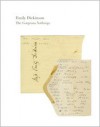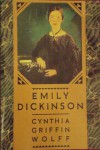Currently reading
Saints in Art
The Gorgeous Nothings: Emily Dickinson's Envelope Poems
Selected Poems
Emily Dickinson
Lies My Teacher Told Me : Everything Your American History Textbook Got Wrong
Gone with the Wind
The Fifth Child
 I reread this the day Doris Lessing died. It's very short, and every sentence packs a heady concentration of power.
I reread this the day Doris Lessing died. It's very short, and every sentence packs a heady concentration of power. This is the novel that introduced me to Lessing. I was lucky enough to be working in a bookstore when it was released; I read a review and immediately used my employee's discount to buy a copy. I think I read it all in one sitting that day, too.
The premise is simple: A man and a woman fall in love because each sees in the other a rejection of the shallow, worldly, sex-is-entertainment values of the '60s (the decade in which this novel begins). They marry and announce their intention of having a very large family. Their relatives are grave and skeptical. David and Harriet can't even afford the mortgage on the sprawling Victorian house they insist on buying; how can they possibly make enough money to support "four, or five...or six!" children?
They're stubborn. Like so many people on the subject of personal happiness, David and Harriet are irrational. They insist that having a big family isn't just something that will make them happy; "This is what everyone wants, really, but we've been brainwashed out of it. People want to live like this, really."
Harriet's mother Dorothy tries to talk some sense into her daughter and son-in-law in the most memorable passage in the book:
"Harriet said fiercely, 'Perhaps we ought to have been born into another country. Do you realise that having six children, in another part of the world, it would be normal, nothing shocking about it -- *they* aren't made to feel criminals.'
'It's we who are abnormal, here in Europe,' said David.
'I don't know about that,' said Dorothy, as stubborn as either of them. 'But if you were having six -- or eight, or ten -- no, I know what you are thinking, Harriet, I know you, don't I? -- and if you were in another part of the world, like Egypt or India or somewhere, then half of them would die and they wouldn't be educated, either. You want things both ways. The aristocracy -- yes, they can have children like rabbits, and expect to, but they have the money for it. And poor people can have children, and half of them die, and expect to. But people like us, in the middle, we have to be careful about the children we have so we can look after them.'"
David and Harriet refuse to listen. They insist that they are old-fashioned people -- a superior breed in a newfangled world -- and they are going to have their unfashionably large family. They view Dorothy's common sense advice as just more persecution from a world bent on destroying deep, strong, solid happiness in favor of fleeting pleasure. They aren't bad people, but they are arrogant:
"Happiness. A happy family. The Lovatts were a happy family. It was what they had chosen and what they deserved."
They never stop to wonder why they should "deserve" happiness when so many perfectly decent people are denied it. They never consider what they are giving back to the world, only what they can get from it -- a house beyond their budget, more children than they can afford to send to "good" schools. Their parents help them pay for the house and care for the children. Apparently there is something irresistible about Harriet and David's insistence that they will have what they want just because they want it.
We've all known people like that.
Most of them don't become the protagonists in a cautionary tale, though.
Fate smiles on Harriet and David, but not in a friendly fashion. So, it says, you want an old-fashioned family? Coming right up.
The Lovatts are blessed with four happy, healthy, rather generic children. And then they conceive a fifth.
To their credit, they don't mean to. Sure, they wanted more children; but not yet. "They had been careful." Well, too bad. Which is fitting. In the real good old days (as opposed to the Lovatts' dreamy vision), birth control was shaky and unreliable. Children came when they weren't wanted, or didn't come when they were. (Okay, that part isn't too different from today.)
Harriet has always suffered during her pregnancies -- nausea, discomfort, fatigue. This pregnancy is different. The baby is frighteningly active, far earlier than the others have been. Its movements feel like blows from a hostile stranger.
My lone pregnancy was very much desired and eagerly awaited, but I related very strongly to some of Harriet's suffering during her fifth. "The only thing that helped was to keep moving" -- oh, yes. I walked two miles the day I went into labor -- not because I was some sort of supermom, but because it was the only thing that would calm this vigorous stranger down, make him stop doing horrible things to my internal organs (or so I imagined). And yes, my son's innocent kicks and punches felt at times as if I were being beaten up from the inside. He had a terrifying habit of hooking one foot under my rib cage and pushing hard. I asked my midwife if it were possible for an unborn baby to break its mother's bones. "It can happen," she replied. "Not often," she added, which didn't exactly make me feel any better.
Harriet has it far worse. Another memorable passage:
"Time passed. It did pass, though she was held in an order of time different from those around her -- and not the pregnant woman's time either, which is slow, a calendar of the growth of the hidden being. Her time was endurance, containing pain. Phantoms and chimeras inhabited her brain. She would think, When the scientists make experiments, welding two kinds of animal together, of different sizes, then I suppose this is what the poor mother feels. She imagined pathetic botched creatures, horribly real to her, the products of a Great Dane or a borzoi with a little spaniel; a lion and a dog; a great cart horse and a little donkey; a tiger and a goat. Sometimes she believed hooves were cutting her tender inside flesh, sometimes claws."
Finally, the baby is born -- early, but none too soon so far as Harriet is concerned. The child she's been waiting to see. And what sort of child have these insistently old-fashioned parents made? A very old-fashioned creature indeed. Some sort of throwback. A specimen of pre-civilized man, perhaps; or perhaps, as Harriet speculates much later, a descendant from the "dwarves or goblins or hobgoblins" that once inhabited our world. "How do we know...that kind of thing didn't really live here? And that's why we tell stories about them? They really existed, once...Well, how do we know they didn't?"
I wish Lessing hadn't gone quite this far. I wish, instead of positing magical creatures, she'd simply stuck with the idea of "Hey, you wanted an old-fashioned baby -- well, here's what people used to look like!" Ben, as he is named, certainly seems to be a specimen of what we used to call primitive man:
"He was not a pretty baby. He did not look like a baby at all. He had a heavy-shouldered hunched look, as if he were crouching there as he lay. His forehead sloped from his eyebrows to his crown. His hair grew in an unusual pattern from the double crown where started a wedge or triangle that came low on the forehead, the hair lying forward in a thick yellowish stubble, while the side and back hair grew downwards. His hands were thick and heavy, with pads of muscle in the palms. He opened his eyes and looked straight up into his mother's face. They were focussed greeny-yellow eyes, like lumps of soapstone."
Be careful what you wish for.
Lessing went on to write a sequel to The Fifth Child: Ben, In The World. I haven't read it yet, and am rather reluctant to. Ben is a perfect symbol in his first novel; I'm not sure he can survive as a real character in his second. But if Lessing felt compelled to write more about him, I'm probably going to feel compelled to read.








